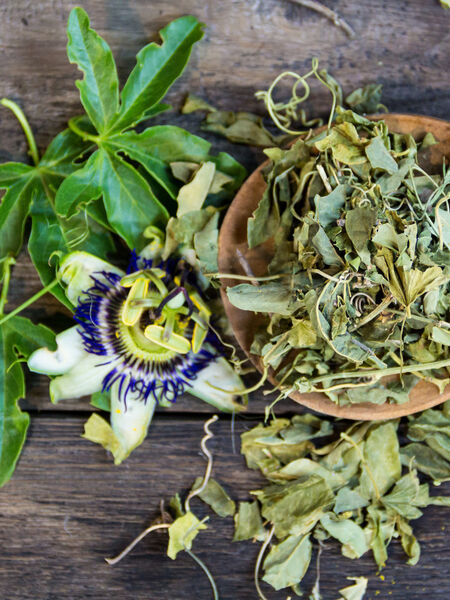All About Calming Herbal Brews Part 2: What's New?

Looking for some unusual herbal teas to offer customers? Consider these four lesser known plants for fantastic additions to any tea seller’s inventory: Moringa, Passionflower, Rooibos, and Honeybush. Each offers health benefits, particularly the lack of caffeine, and excellent antioxidants that are equal to if not more than our true tea go-to, the Camellia sinensis.
For in-store demonstrations, display teas in white bowls to show off their shapes and colors. Brewing is the same as traditional herbals, use fresh, clean water heated to boiling, 212° F., and steep at least 5 minutes or longer to taste. For iced versions, brew as usual and chill before serving.
Moringa (Moringa oleifera)- Your customers may have heard of supplements for moringa, but may not have been exposed to the refreshing moringa leaves, dried to perfection for use as a tea. They, and you, are in for a refreshingly delightful daytime drink. This plant is experiencing world-wide renaissance for its antioxidant content.
The bean pods, root, seeds, and leaves of the moringa plants are all used but it is the leaves that are either eaten boiled like spinach, or dried for use as a tea. The leaves contain loads of Vitamins C and A, calcium, iron, polyphenols, saponins, tannins, and thiamine. Some recent studies have shown it may lower cholesterol, reduce plaque in arteries, acts as an anti-inflammatory, and help regulate blood glucose. For most people, it is energizing, so while it has no caffeine, it may be more suitable for a morning drink than a nighttime beverage.
The dried leaves provide a tangy, herbaceous taste with a smooth, satisfying finish that is wonderfully accented with a dab of honey. The plant grows in the foothills of the majestic Himalayan Mountains of India and in Africa.
Passionflower was first used in the Americas and later in Europe for anxiety and insomnia as it increases the level of gamma-aminobutyric acid (GABA) in the brain increasing relaxation. Milder than valerian root or kava, passionflower is often combined with lemon balm for both its flavor and its own ability to help reduce anxiety.
Passionflower's unique name is attributed to folklorists who attributed the flower’s unique five petals and five sepals to the crown of thorns worn by Jesus. The sepals range in color from magenta to blue and the flowers are white. Many varietals of this beautiful flower exist but only Passiflora incarnate is used to address anxiety, insomnia, or seizures. The flowers, leaves, and stems are all used in the brew which produces an earthy grassy green taste that welcomes the addition of lemon balm and/or chamomile. (Please try our Daydream wellness blend which incorporates passionflower as an important calming ingredient- Editor.)
Rooibos, a tea made from the bark of the South African red bush tree, is an anomaly among herbal brews. The plant (Aspalathus Linearis) grows only in the regions of the fabled Cederberg Mountains, has no caffeine like most plants, yet it has as many disease-fighting antioxidants as true tea plus beneficial mineral content. The leaves turn a beautiful coppery red when oxidized and the color is similar in the cup. Its taste is fresh and vegetal in the raw green form and woodsy and soothing when oxidized. Both take to flavorings especially vanilla, caramel, or fruits. Both green rooibos and oxidized (aka "red") rooibos have wide ranging health benefits. Best of all, it does not demand careful timing to brew, making it the perfect “first” tea for newbies to loose-leaf brewing.
Honeybush, considered a relative to rooibos because of its similar taste, is actually part of the Fabacease family of flowering legume plants and is available under its Afrikaans name, Heuningbos, or the botanical names Cyclopia and Ibbetsonia.
Honeybush is grown in South Africa’s Eastern Cape region and so named because its flowers smell like honey. The brewed beverage is indeed sweet with a full-bodied toasty flavor that is smooth and clean. Honeybush is slightly sweeter than rooibos and has similar impressive antioxidants and other health-giving benefits. Honeybush also takes to flavorings well, so blending enthusiasts love it.
Herbals love honey! A perfect marriage to centuries-old herbal brews is the equally legendary honey. Use just one teaspoon up to one tablespoon of this Raw Garden Herbals Honey to bring out the natural herbaceous qualities of tisanes without overpowering them with sweetness. Made from the nectar of the blueberry plant, this mono-floral honey sports a medium amber color, slightly floral flavor, and all the natural pollen of honey produced by careful, attentive beekeepers in Maine, USA. 12 oz. jars of 16 to 32 servings.

